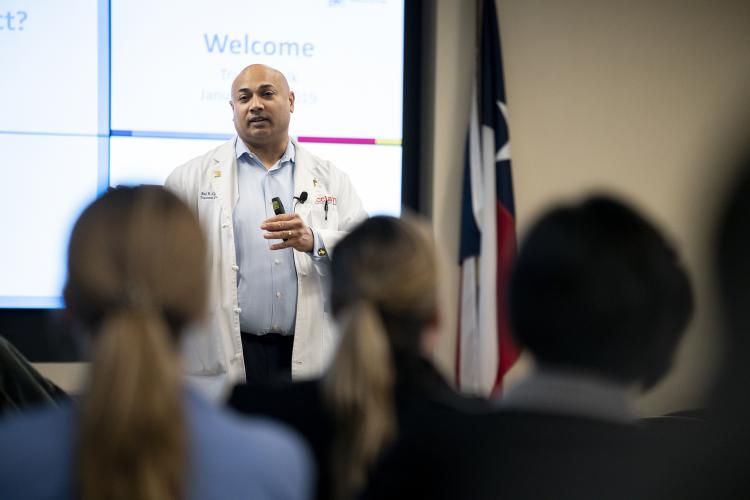
While doctors learn in medical school how to repair broken bodies, often times they don’t learn everything they need to know about the importance of compassion for patients and their families.
That’s unfortunate because many doctors will tell you that delivering bad news to a patient or the patient’s loved ones is by far the toughest part of their job, said JPS Health Network Medical Director of Trauma Services Dr. Rajesh Gandhi.
After a devastating experience nearly a decade ago when his first wife, Swati, died after a year-long fight against leukemia, Gandhi became determined that neither he nor any of the resident physicians he mentors would make the same mistakes her doctor did.
“She was in multi-system organ failure,” Gandhi recalled. “We knew we needed to make a tough decision, so we had a meeting. The oncologist just walked in and just said ‘well, there’s nothing we can do, so we’re going to take her off the breathing machine.’ That was it.”
The way the oncologist was so insensitive made Gandhi and his parents, who also attended the meeting, feel like the physician didn’t have anything invested their loved one. It was as if he wasn’t concerned whether she lived or died.
“It really made me feel like a dollar sign, nothing more,” Gandhi said. “My father was 70 at the time and I just couldn’t believe what happened in front of him. It was so abrupt and disrespectful. I felt our patients deserve much better than that. It was the start of a new road for me.”
Trying to make something positive out of something so devastating, Gandhi dedicated himself to recognizing the need for physicians to take responsibility for helping families of critically injured, seriously ill and dying patients heal from what is a very traumatic experience they’ll carry with them for the rest of their lives.
Gandhi went to work, creating a list of things that families deserve to know in a time when critical conversations take place and coming up with a formula for how to deliver the necessary information. He’s shared that information with his colleagues who work at JPS, striving to constantly get better at an impossibly tough job.
“We involve the chaplain services and we make sure we’re prepared,” Gandhi said. “If we have to go back to the starting point and go through everything that happened, we go back to the starting point. We carefully explain the injuries so they know exactly what we’re dealing with and discuss the survivability. It’s important to build trust and respect by being open about what’s going on and by letting the family know we’re treating their loved one as one of our own.”
JPS Emergency Department physician Katie Holmes said it’s important to try to see things through the eyes of patients and their family members.
“I try to think about how I would feel in that situation. We don’t want people to be sitting and waiting for answers longer than what is absolutely necessary,” Holmes said. “It’s not an easy job because we’re seeing people on the worst day of their life. When we meet with them, their reaction is never something that I take personally.”
JPS works with its residents to hone their communication skills and to make sure they’re tactful and compassionate when they’re working with patients or their families. Dr. Tricia Elliott, Vice President of Academic Affairs at JPS and Chief Academic Officer at JPS, said that’s important not only for patients. But also for young physicians who are learning to deal with the stress of a high-pressure job.
“They need to learn how to handle these things so they don’t weigh on them and contribute to burnout, Elliott said. “Caregivers have to take care of themselves to be able to provide the best care possible for their patients.”
Gandhi said it’s tough to realize you have to break the heart of a parent or spouse by telling them bad news about someone they love and doctors carry that burden with them long after the meeting is over.
“My allergies have been known to act up during family meetings, if you know what I mean,” Gandhi said. “It used to be against the unwritten rules to let the family see you cry. But I think that’s changed. It lets them know that you’re human, too.”
Not only does JPS help residents learn how to talk to families. Gandhi and Elliott are playing a role in creating the curriculum at the newly-established Texas Christian University and University of North Texas Health Science Center Medical School in Fort Worth. There, learning about compassion and communication will be part of the education process.
JPS Director of Spiritual Care and Ethics Lee Ann Franklin said there will always be more for caregivers to learn as long as they practice their profession. There’s no substitute for experience.
“Every family and every situation is different,” Franklin said. “There is no script because the best thing for one family might be the worst thing for another. We just have to keep working to support each other in getting better.”
Holmes said delivering bad news will never be easy. But the process is valuable to both the families of patients and healthcare providers.
“It’s hard to tell a family that you can’t help someone they love,” Holmes said. “It’s so sad. We need to do everything we can to support them – and we have to make sure our techs, nurses and everyone else on the team is okay because it hurts us, too. But then you have to pull it back together and go back to the emergency department because we know there are seven more patients waiting there in need of our help.”
